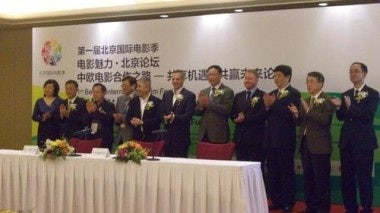Chinese Blockbuster "Let The Bullets Fly" Has American Premiere In New York#
A roundup of news from the Chinese film industry, which this weekend saw the opening of the first annual Beijing International Film Festival, the American debut of Jiang Wen's blockbuster "Let The Bullets Fly" at the Tribeca Film Festival in New York, and discussions about closer partnerships between Chinese and European filmmakers in coming years.
Inaugural Beijing Film Festival Launches At National Center for the Performing Arts#

Jackie Chan and Zhang Ziyi received "Image Ambassador" awards at the opening of the BJIFF
Perhaps looking to address the fact that Beijing has lacked a major international film festival despite being the center of China's filmmaking industry, this past Saturday the first-ever Beijing International FIlm Festival (BJIFF) kicked off with an event at the National Center for the Performing Arts ("The Egg") attended by celebrities like Jackie Chan and Zhang Ziyi, film industry luminaries like John Woo, and a hodge-podge of government officials and film executives. As the Hollywood Reporter points out, while the BJIFF will feature an impressive array of films over the course of its six-day run, some question whether it's a valid attempt to create a world-class event, or is simply an attempt to take the wind out of the Shanghai International Film Festival's sails.
The hasty organization of the BJIFF, first publicized internationally in February at the Berlin International Film Festival, had some observers wondering if it was designed to steal a march on the Shanghai International Film Festival, held each June, and refocus in the hands of the central government control of an industry deemed a key part of the Chinese Communist Party's plans to use all media to improve China's image around the world.
Further making the BJIFF unusual among global festivals is the fact that it will include no world premieres and no prizes will be awarded. According to the Reporter, some attendees felt the timing of the festival -- which coincides with the Tribeca Film Festival in New York City -- was less than ideal.
Some guests wondered aloud how the new event might be affected by its timing considering its competition for attention with the ongoing Tribeca Film Festival and the annual industry rush to prepare for the granddaddy of all festivals in Cannes in May.
"The fact that the Shanghai International Film Festival has succeeded over thirteen years each June and has inspired Beijing makes sense. Beijing is a major city and it should have its own event," said Michael Werner, the chairman of Hong Kong-based sales and investment company Fortissimo Films. "Is this festival in the best time in the calendar? Probably not."
Still, healthy contingents of executives from Japan, Korea, Europe, Australia and New Zealand turned up at the festival and for the concurrent and longer-established Beijing Screenings market event, now folded into the BJIFF from its previous date in September.
Jiang Wen's Blockbuster "Let The Bullets Fly" Gets U.S. Premiere#

"Let the Bullets Fly" theatrical poster
Speaking of the Tribeca Film Festival, this weekend director Jiang Wen attended the U.S. premiere of his blockbuster "Let The Bullets Fly," which has been one of the most successful films at the Chinese box office since its premiere last December. From the Los Angeles Times:
On Sunday evening at Tribeca, "Bullets" had what festival organizers described as its first public screening outside a Chinese-speaking region, after this winter becoming the biggest Chinese-made box-office hit in the history of the country. Theories abound as to the reason for that success; one explanation has it that Chinese filmgoers returned to theaters again and again to parse the movie's political meaning, the way teenagers around the world went back again and again to parse the expressions on Leonardo DiCaprio's face in "Titanic."
Audiences in this country were more divided on "Bullets." At least a few people on Sunday were spotted walking out of the theater, but several of those who stayed welcomed the director to the stage with a standing ovation. Judging by the questioners, many of the most enthused were native Mandarin speakers.
While the article notes that a theatrical run of the film "could be in the offing," one American buyer added that the film's complex narratives, and the historical and political understanding required to make sense of its multi-layered storyline, could make "Let The Bullets Fly" a challenge for a broad audience.
Beijing Turns Attention To Euro Co-production#

Attendees at the discussion
Film Business Asia looks at Beijing's recent push to increase cooperation between the Chinese and European film industries. As Zhang Xun, president of the China Film Co-Production Corporation, said at a meeting this weekend, of the 340 official co-productions made by Chinese companies since 2000, only 29 have been made with Europe. Additionally, Film Bureau chief Tong Gang said, closer cooperation with European producers could help provide technical and cultural benefits to Chinese teams, as well as expanding the market potential for cooperatively produced films. From Film Business Asia:
Dennis Wang, co-chief of Huayi Brothers, chronicled the recent history of co-productions by Chinese firms. He said an early phase was based on financial necessity, when Chinese companies struggled to raise appropriate budgets from within the country. This phase was at its height when Hollywood studios, notably Columbia and Disney, and when Hong Kong companies were major partners. Now, with ballooning box office receipts in China, "money is the least important factor," he said. "Instead we are seeking marketing partners."
Huayi has not made a European co-production to date, though Wang said he was open to the idea as it might help ease the shortage of actors and directors in China. "Movies and TV series are getting postponed in China because actors schedules are already too full. Globalisation of production could be a solution."
Yu Dong, head of rival private-sector conglomerate Bona Group, was similarly forward looking. He forecast that the Chinese theatrical market could triple in size to RMB30 billion in the next 5-8 years and that "we will need experienced directors and producers." "We will have to co-produce some English-language films," he said.
Despite the enthusiasm displayed by attendees at the discussion, it will remain to be seen whether Sino-European co-productions really become common in coming years. The most likely outcome will be more Sino-French productions, as China and France signed an official treaty outlining this type of cooperation last year. Speaking about the potential for these types of film projects, French director Jean-Jacques Annaud mentioned that he is currently preparing to spend a year in China shooting Wolf Totem, beginning in 2012.
"If it becomes [an official] co-production," Annaud said, "that would really be a first."